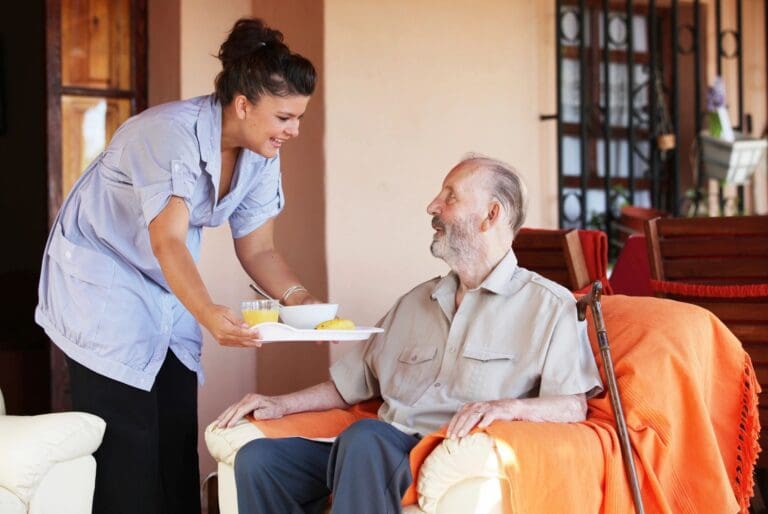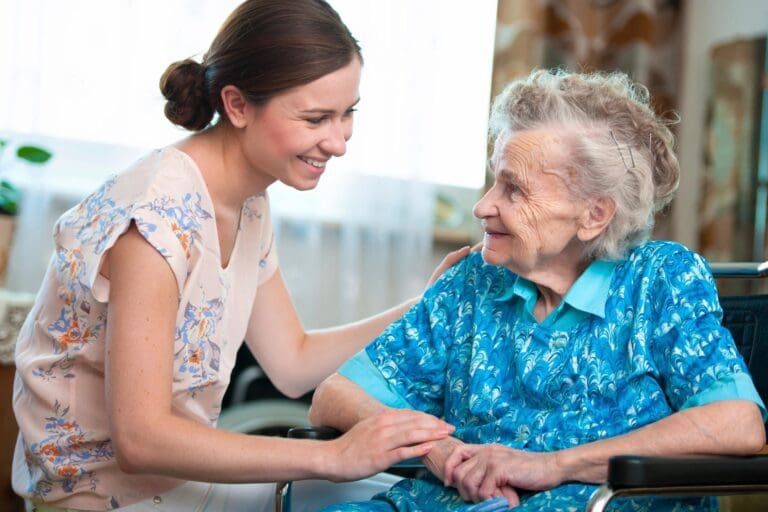Living with Caregiver

Living with Caregiver
Ruby – My Mom
Jay – My Dad
Transitioning from remote worry over imagined issues to direct involvement transforms a caregiver into the ringmaster of a vivid and sometimes whimsical circus of in-home senior care. This role encapsulates managing the high wire acts of daily logistics and the clown car of emotional dynamics, all under the big top of family life, where real challenges and unexpected joys parade daily.
The best thing that came out of their move was the bond that my kids got to build with their grandparents.
The grandparents were a welcoming committee when the kids came home. As the clock struck 2 pm, my parents would be on high alert for the highlight of their day. They would anxiously wait for the garage door to open.
That was their queue to line up in front of the door between the garage and hallway to the living room. At the first sight of the grandkids, the two grandparents would break into a song “Hello! Dear grandkids, we are so glad to see you!”
The four would have a snack together and play games. When time came for homework, my dad would help wherever possible with math and science.
It was heartwarming to see their relationship blossom, and the memories they created for each other are truly priceless.
I, on the other hand, faced my parents’ ups and downs as I checked in on them in the morning before I left home and again in the evening. They would take my mood and I theirs.
In the mornings I would always ask, “How was your night?” and in the evening, “How was your day?” Sometimes, I would get really long answers as they wanted to engage me in conversation and get me to interact with them for as long as they could. I found myself irritated with them for giving me such long answers and making me late for work.
In time, I figured out how to have a pleasant discussion with them every morning by saying, “I hope you had a great night and pray that you will have a wonderful day.” What I was trying to do was acknowledge the previous night in a positive tone, set a path forward for the upcoming day, and also give them a little project to keep them busy.
I would say things to them like, “I really need for you to say a special prayer for me,” or “Can you say a prayer for your granddaughter, she has a difficult test today.” I would also add things like, “It is going to be an exceptionally beautiful day today, can you please go for a walk around the neighborhood and stop by the neighbor’s home and ask them for the gardener’s phone number?” or “your grandson needs to learn chess for his Boy Scouts merit badge, can you please teach him how to play when he gets home from school?” By giving them a few options of things to do, I wanted them to feel they were in charge of the day.
I found that giving them a project to do during the day helped them feel productive. At night, I would ask for a status on their project or provide status on how well their prayers worked.
I would end the conversation by saying, “I think we all need a good night’s sleep after a productive day today.” This would usually make them feel that they accomplished something and that their life had meaning. And in fact, it truly did.
The one topic that they wanted to discuss every few days was their move to the USA. They both felt too dependent on me.
“I feel like I constantly bother you to help me with things, I just don’t like that?” My dad would say. Then my mom would pile on “I always prayed that God would take me before I became dependent on others.”
Then the conversation would turn to “Maybe we should move back to Karachi.” I would each time re-explain “If you move back before you become a US citizen, you must come back every 6 months. It will be too difficult for you both. Let’s wait till you are a citizen of the USA and then you can go back.”
Knowing full well that at the pace their health was declining in 5 years that certainly would not be a viable option, as it was not even a viable option now.
The day that topic was put to bed, it started with a scream from my mom at the top of her lungs. My mom normally spoke in a very soft tone and her volume was very low. So, when I heard her blood curdling scream, I flew down the stairs.
I found my dad on the bathroom floor looking a bit confused. I helped him get up and put him in a chair. “Dad, are you ok?” Surprisingly, my mom answered for him, that was quite a role reversal. “Your dad must have fainted in the restroom, he was in there for too long and so I went to check on him, when he did not respond to me calling out for him.”
As I picked up the phone to call 911, my mom whispered, “Thank God we are here with you, I don’t know how I would have handled this if we were in Pakistan.” Her eyes filled with love, and gratitude towards me. This was the first time she truly understood the value of her big sacrifice, her cherished home and community in Karachi.
I replied, “There is a time and place for everything!” with a wink. As that was her go-to phrase with me as I was growing up when she had to tell me “No, you cannot”, it was always followed up with that phrase.
The “Time and Place” for my parents to live in my home came and went. What I feel now is it went way too fast. With guilt, I will confess that at that time it felt very difficult. It was difficult to juggle my job, day to day needs of my kids, home, marriage, and self-care. The one thing I completely sacrificed during that time was self-care.

Grandma Agnes's New Start
Agnes had always been a fiercely independent woman, living alone in her house in Oregon with her loyal dog, Buster. As she got older, managing daily tasks became harder. Her arthritis made it difficult to move around, and she often felt isolated from friends and family.
Her neighbor, Mr. Johnson, would drop by to check on her and bring groceries, but he had his own life and couldn’t be there every day. One morning, Agnes struggled to get out of bed, and it was a wake-up call for her daughter, Sandy.
“Mom, how are you holding up?” Sandy asked during their weekly call.
Agnes sighed. “It’s getting harder, Sandy. Buster keeps me company, but I can’t do everything I used to.”
Sandy’s concern deepened. “Mom, we want you to move in with us here in California. We have plenty of space, and you won’t be alone. Plus, the kids would love to have you around.”
Agnes hesitated. “I don’t want to be a burden. And what about Buster?”
“Buster is welcome too,” Sandy assured her. “We want you to be safe and happy. Please think about it.”
After much deliberation, Agnes agreed to move. Leaving her home was tough, but the thought of being closer to family was comforting.
In California, Agnes was welcomed with open arms. Lydia and Lucas were thrilled to have their grandmother around. They helped her settle in, and soon the house was filled with laughter and the smell of freshly baked cookies.
“Grandma, can we bake cookies today?” Lydia asked one afternoon.
Agnes smiled warmly. “Of course, sweetheart. Let’s make my special chocolate chip cookies.”
Baking became a regular activity, and the kitchen was always bustling with activity. Agnes found joy in teaching her grandchildren how to bake, and they loved spending time with her.
Sandy and Peter noticed the positive change in Agnes. She seemed happier and more engaged. However, there were still challenges. Agnes’s arthritis required regular medical attention, and some days were better than others.
One morning, Sandy found Agnes sitting quietly on the steps with Buster. “How are you feeling today, Mom?”
Agnes looked up, her eyes filled with contentment. “Better, thank you. It’s nice to have company and feel useful again.”
To keep Agnes active and involved, Sandy and Peter gave her small projects around the house. Agnes would water the plants, help with simple meals, and play games with the children.
“Grandma, can you teach me how to play chess?” Lucas asked one evening.
“I’d love to, Lucas. Chess is a wonderful game,” Agnes replied.
As the months passed, Agnes’s bond with her family grew stronger. The daily interactions brought her a sense of purpose and belonging. The grandchildren loved having their grandmother around, and Agnes cherished every moment with them.
One day, as they all sat around the dining table, Agnes looked at her family and felt a wave of gratitude. “Thank you for bringing me here. I didn’t realize how much I needed this.”
Sandy squeezed her mother’s hand. “We’re glad you’re here, Mom. We love having you with us.”
Life wasn’t always easy, but the love and support from her family made all the difference. Agnes’s move to California turned out to be the best decision, bringing joy and companionship into her later years.

Dad's Journey to Healing
Thomas had always been a resilient man, proud of his ability to manage on his own. After his wife passed away unexpectedly from a stroke, Thomas’s life took a turn for the worse. He fell into a deep depression, withdrawing from friends and family. His son, Jacob, watched helplessly from afar, worried about his father’s deteriorating condition.
One evening, Jacob decided to call his father. “Dad, how are you holding up?”
Thomas’s voice was distant. “I’m fine, Jacob. Just trying to get by.”
Jacob knew his father was struggling. “Dad, you don’t sound fine. You’ve shut yourself off from everyone. Why don’t you come live with us? The kids miss you, and we can help you.”
Thomas resisted. “I don’t want to be a nuisance, Jacob. I’m used to living alone.”
“You wouldn’t be a problem,” Jacob insisted. “We want you here. Plus, we can watch the game together every Sunday, just like old times.”
Thomas was silent for a moment, considering his son’s offer. “I’ll have to think, Jacob. It’s a big change.”
“It’s worth it, Dad. You need to be around family. Please think about it,” Jacob pleaded.
After several conversations and the promise of spending time with his grandchildren, Thomas finally agreed to move in with Jacob’s family. The transition was difficult; leaving his home was a painful reminder of his loss. But the welcoming embrace of his family provided some comfort.
Jacob’s children were thrilled to have their grandfather around. They spent afternoons playing board games and listening to Thomas’s stories about his younger days. “Grandpa, tell us about when you were a firefighter!” Jacob’s son, Jordan, would often ask.
Thomas’s eyes would light up as he recounted his adventures. “Well, there was this one time…”
Despite the happy moments, Thomas’s depression lingered. Jacob noticed his father’s struggle and made sure to include him in family activities. They watched football games together every Sunday, a tradition that brought a sense of normalcy back into Thomas’s life.
“Dad, I’m glad you’re here,” Jacob said one Sunday after their team won. “The kids love having you around, and so do we.”
Thomas smiled, though his eyes were still clouded with sadness. “I’m glad too, Jacob. It’s just hard sometimes.”
“I know, Dad. But we’re here for you. You’re not alone,” Jacob reassured him.
As the months passed, Thomas’s health continued to decline. Jacob and his wife provided the care he needed, ensuring he was comfortable and supported. The bond between father and son grew stronger, even as Thomas’s physical strength waned.
One night, after a particularly tough day, Jacob found Thomas sitting quietly in his room. “How are you feeling, Dad?”
Thomas looked up, his expression weary but grateful. “I’m tired, Jacob. But being here with you all makes it easier.”
Jacob hugged his father. “We love you, Dad. We’re glad you’re with us.”
Thomas’s final days were filled with the warmth and love of his family. The sadness of losing his wife never fully disappeared, but the presence of his son and grandchildren brought him a sense of peace. He passed away surrounded by those who loved him, leaving behind a legacy of resilience and love.
Jacob, holding his father’s hand in those last moments, whispered, “I love you, Dad. Thank you for everything.”
Thomas smiled faintly. “I love you too, son. Always.”
The journey had been difficult, but the bond between father and son made it meaningful. In the end, the love and support of family provided the healing Thomas needed.




